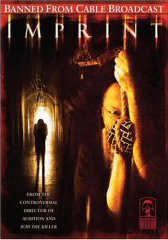
Never less than entertaining, director Takashi Miike has long been known for his fetishistic devotion to subversive images and themes, coating high-action plots and subversively rich themes with scathing gore, shockingly frank sexual intensity, and a childlike sense of wonder that makes these exploitative elements disturbingly natural and repulsively incriminating. Nihilistic yet joyous, Miike is a peon of contradictions. On one hand a cinematic terrorist, challenging both his own culture and the rigid morality of the West, Miike also defies the conventional structure of film, opting to direct his pessimistic puzzles according to their emotional energy -- operating on a surrealist-like dream logic of expressionism rather than enslaving himself to logic. Finding beauty in brutality, Miike made suffering art in Audition, which stands out as his most beautiful and emotionally painful film thus far. A similar balance of terror and awe occupy the metaphorical borderlands of the remainder of his films. Perhaps this is seen nowhere else with such depth as in Imprint, a horror film that treats itself (and its viewers) without the thematic band-aids or stylistic dilution that often softens the emotional blow. Miike exposes no such hesitancy. In this now legendary episode of the Showtime series, Miike attacks the mind with as much ferocity as his intellectual/emotional stances question the simplistic morality of the status quo. A ballet of brutality and dark beauty, Miike's latest cinematic outrage celebrates pain without the traditional use of a moral message to justify the carnage -- for in this world violence requires (and often lacks) justification.
Based on a novel by Shimako Iwai, the plot is less fragmented than many of Miike's other macabre ministrations. An American searching for his lost love Komomo discovers a secret that will shake the foundation of his psyche in a small Japanese town. This decadent environment is filled with prostitutes, the ruined remnants of broken dreams, and more than a little spilled blood. Encountering a prostitute friend of Komomo's, who tells him about her fate, our protagonist ignores her warnings of peril, continuing his search until he locates a truth that, too late, he wishes that he never found. An impressive reworking of the Pandora myth twisted inside out and merged with the Faustus motif, Imprint suggests the consequences of personal actions without directly advocating any one ideal. In fact, his refusal to preach -- his bold refusal to point a finger -- lends the story an even more subversive tone. Horrible things occur in this attack against the senses, and there is no miracle or clean-cut solution to make the desperate lives of characters any better. This honesty of vision and strength of insight is Miike's trump card, embellished through his intense emotional fervour and disregard of cinematic rules.
Distorting rules of reality, conscious, and expectation without quite abounding reality for fantasy, evoking a surreal sense of nightmarish menace in a setting unspeakably real in its ability to torment, Miike creates in Imprint a hell at once both physical and metaphorical. More importantly, he lends a naturalistic world a shadow-land sense of repulsive, heart crushing wonder -- finding the amazing not in a supernatural solution but in the very wicked heart of the everyday. Of further note is the ease with which Miike leads up to the horrifying conclusion, allowing characters the room to breath and live, experience and transform. Rather than jumping right into a cesspool of corruption or gore, sex or thrills, Miike wisely allows the story to expand. As a result, the terror, when it comes, is twice as effective. While the most obvious horrors are physical, featuring such travesties as mistreated foetuses, abused flesh, and tortures involving various body parts and needles (all of which apparently scared the balls right off of Showtime executives), more impressive are the emotional motivations of characters, and the underlying themes instigating such atrocities. Choosing to disturb in a cultural era when horror entertainment is little more than 'product' touted as a financial commodity, Imprint is a bold and intelligent example of truly disturbing horror, as repulsive as it is daring in its amoral position.
As in the case of all the Masters of Horror series, visual and audio quality is superb. The picture, featured in 1.77:1 widescreen (and anamorphically enhanced) is crystal clear. No grain, lines, splotching or other defects are noticeable. Audio, likewise, is impeccable, offered in Dolbv Digital 5.1 and Dolby Surround 2.0, both of which are crisp and clean. Extras are rich and informative, going into detail about the film, the cast, and the crew. These futurities and interviews allow one to better appreciate and enjoy not only the finished product, but all the work that went into its creation. "I Am the Director of Love and Freedom" is filled with Miike weirdness, further cementing the fact that the director is a force unto himself and unconcerned with the banal opinions of detractors. "Imperfect Beauty: The Make-up and Special Effects of Imprint," the next supplement, is a much appreciated, extremely detailed look at the planning and execution of special effects, full of good humor and technical know-how. "Imprinting: The Making of Imprint -- Featuring Interviews with Cast and Crew," while covering some familiar ground, does so in an engaging, personable manner. In this portion we learn more about the inspiration for the cast ands crew, and follow briefly the road from planning to production. The Audio Commentary track with Chris D. and Wyatt Doyle is somewhat uneven but intriguing nonetheless, covering various nuances of the story that may have escaped one's attention. Trailers, Still Gallery, a Miike Bio, and DVD Rom Screenplays and screen savers round out this impressive presentation of one of the genre's most mature, tragic, and emotionally bold offerings.
Review by William P. Simmons
| Released by Anchor Bay USA |
| Region 1 - NTSC |
| Not Rated |
| Extras : |
| see main review |